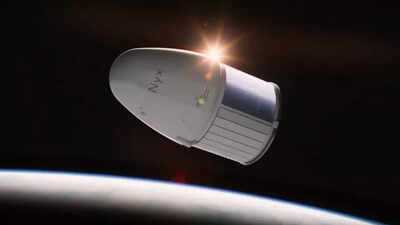SpaceX is set to launch over 150 capsules containing cremated remains and DNA samples into low Earth orbit on June 23rd, in a mission that merges space exploration with personal commemoration. This launch, part of the Transporter 14 rideshare mission, is a collaboration between Celestis, a Houston-based space burial company, and The Exploration Company (TEC), a European spacecraft firm.

A conceptual rendering of the upcoming SpaceX launch.
Dubbed the "Perseverance Flight," this symbolic journey allows families worldwide to send the remains of loved ones, or even their own DNA, into space. This act serves as a memorial or a celebration of cosmic curiosity. The mission will see the capsules orbit the Earth before re-entering the atmosphere and splashing down in the Pacific Ocean.
Since 1994, Celestis has pioneered the concept of space burial services, providing a unique way to honor loved ones with a final voyage beyond our planet. The Perseverance Flight marks Celestis’s 25th mission and its 12th "Earth Rise" flight. This type of mission sends remains into orbit for a time, before allowing them to return to Earth. Unlike missions that send remains into deep space or to the moon, this Earth orbit mission allows for the capsules to be recovered, offering families a memento that has truly travelled through space.
Celestis has a history of flying the remains and DNA of a diverse array of individuals, including celebrities, pets, and even historical figures. Previous missions have carried symbolic remains of U.S. presidents such as George Washington and John F. Kennedy, as well as Star Trek icons like Gene Roddenberry and Nichelle Nichols. This time, the mission includes 3-year-old Matteo Barth, who will become the youngest European to send DNA into space, symbolically uniting with his late grandfather, a dedicated space enthusiast.
The memorial capsules will be housed within TEC’s Mission Possible spacecraft, which will launch atop a SpaceX Falcon 9 rocket from Vandenberg Space Force Base in California. After achieving orbit, the spacecraft will circle the Earth two or three times before re-entry. The payload will then splash down in the Pacific Ocean, where recovery teams will retrieve it. Afterwards, the capsules are returned to the families as meaningful keepsakes that have journeyed to space.
Many people find that sending DNA or ashes into space offers a deeply personal and meaningful way to honor those who cherished science, exploration, or the vastness of the cosmos. For others, it is a way to symbolically become part of humanity's grand adventure among the stars. This act transforms remembrance into an extraordinary voyage, fulfilling lifelong dreams of touching the stars, even if only in a symbolic sense.
This mission represents TEC’s second demonstration before the debut of its Nyx Earth orbital vehicle, which is slated to dock with the ISS by 2028. For Celestis, the partnership unlocks new opportunities in accessible space memorials. As commercial spaceflight becomes more common, missions like this highlight how space has permeated human narratives and the creation of lasting legacies.
Newer articles
Older articles
 Wimbledon’s youthful buzz: Smelling of teen spirit ahead of the Championships
Wimbledon’s youthful buzz: Smelling of teen spirit ahead of the Championships
 Chess Sensation Praggnanandhaa Joins Magnus Carlsen's Team Liquid Ahead of Esports World Cup
Chess Sensation Praggnanandhaa Joins Magnus Carlsen's Team Liquid Ahead of Esports World Cup
 Bennett to take no further part in SA Test, Masvaure named concussion substitute
Bennett to take no further part in SA Test, Masvaure named concussion substitute
 Gavaskar Calls for Kuldeep Yadav Inclusion in Second Test Amid Bumrah Fitness Concerns
Gavaskar Calls for Kuldeep Yadav Inclusion in Second Test Amid Bumrah Fitness Concerns
 Stokes Lauds England's Opening Duo After Stunning Headingley Chase Against India
Stokes Lauds England's Opening Duo After Stunning Headingley Chase Against India
 Nitish Rana Set for Delhi Return After Disappointing Uttar Pradesh Stint
Nitish Rana Set for Delhi Return After Disappointing Uttar Pradesh Stint
 Nitish Rana Eyes Delhi Return After Disappointing Uttar Pradesh Stint
Nitish Rana Eyes Delhi Return After Disappointing Uttar Pradesh Stint
 India Squad Update: Harshit Rana Released Ahead of Second Test Against England in Birmingham
India Squad Update: Harshit Rana Released Ahead of Second Test Against England in Birmingham
 Rishabh Pant Redefining Cricket: Greg Chappell Hails Wicketkeeper-Batter as a "Match-Winner"
Rishabh Pant Redefining Cricket: Greg Chappell Hails Wicketkeeper-Batter as a "Match-Winner"
 Steve Smith Eyes Grenada Test Return After Finger Injury
Steve Smith Eyes Grenada Test Return After Finger Injury